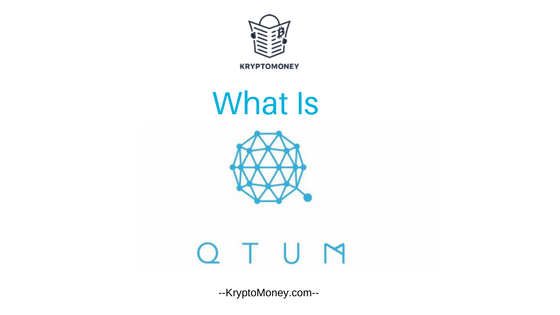
Qtum, pronounced as Quantum, is a Singapore based blockchain platform which is capable to execute smart contracts and decentralized applications on top of Bitcoin’s stable blockchain while using Proof-of-Stake consensus for verification of transactions.
Qtum is a mix of Bitcoin and Ethereum. Actually, Qtum is built on a bitcoin core fork, but the Qtum foundation has created its own hybrid blockchain with the help of several key tools. Qtum uses bitcoin’s blockchain because of its simple and stable nature, allowing the foundation to build upon it more easily.On top of the foundation, it uses a layer of abstraction that enables Qtum to combine several virtual machines that contribute different functionalities. Most important among these is the Ethereum Virtual Machine, which gives Qtum the ability to create its own smart contracts.
Bitcoin was created to be a value transfer program and Ethereum is principally a smart contract platform. Qtum is the mix of these two, a transfer protocol which also supports decentralized apps and smart contracts. So, Qtum is a platform that connects the prevailing blockchain with a virtual machine. Qtum allows the developers to build apps and smart contracts on the existing blockchain network.

Qtum aims to establish a range of services which will bridge the existing gap between blockchains and the business world. These include some methods and tools to standardize the workflow of business smart contract development, and a hub of tested and verified smart contact templates, addressing various specialized business use cases. The goal was to launch the first Value Transfer protocol which will reorganize the business routines and will facilitate their simpler adoption.
By integrating the Bitcoin’s blockchain with the ability to run Ethereum’s Smart Contract, Qtum tries to increase the range and interoperability of smart contract applications, especially for commercial purposes. In addition, Qtum will implement tools, templates, and other plug-and-play smart contract options to make it easier for businesses to build and execute smart contracts.
The Qtum cryptocurrency a year ago, that is, in March 2017 was launched as a crowdfunding campaign to get the needed funds for the development of a new blockchain based platform. 51 million tokens were sold to the public through 6 exchanges.
Over 10 million dollars worth of Qtum were subscribed only within 90 minutes only. A total of 51 million tokens of QTUM were distributed to the public, which included 11,156.766 Bitcoins and 77,081.031 ethers. According to the Qtum’s whitepaper, the remaining 49% were allocated as follows. 29% were to be allocated as community incentives and the outstanding 20% were to be given to the development team and early backers.
Bitcoins ledger uses a concept called Unspent Transaction Output (UTXO). This means that every transaction on the blockchain network is a reference to the previous transaction and anything not spent from that transaction is given back to the sender as a change. The Bitcoin’s blockchain only tracks the transactions and not the balance of an account. So, UTXO provides a small degree of privacy and is compatible with some types of scaling paradigms.
Ethereum’s ledger is more like a bank ledger that tracks the balance of an account. Whenever you send or receive ether, the balance on the Ethereum ledger is upgraded with your new balance. This approach is a big help and easily understood by the new developers and can also save large space because the record of every transaction is not required. This model works better for smart contracts as smart contracts may include some complex logics which cannot be recorded in Bitcoin simple scripting system.
What Qtum does is that it combines the best of Bitcoin and Ethereum. It unites the Bitcoin’s stability with Ethereum technology. The Qtum operates the version of Ethereum virtual machine, which is responsible for the execution of smart contracts, on the Bitcoin’s blockchain.
According to the team behind QTUM, UTXO is a simpler and straightforward approach to verify transactions and it allows processing multiple transactions, irrespective of their sequence, at the same time. But here comes the problem of the difference between the ways Bitcoin and Ethereum store data (as mentioned above). But this problem is solved with an Account Abstraction Layer that transforms the outputs given by blockchain into the account balances and allows the transfer of information between UTXO blockchain and EVM. This is the biggest technological contribution of Qtum.
A smart contract is a computer program designed to digitally verify, facilitate or enforce the performance of a contract, without any requirement of the third party. Smart contracts exist due to blockchain and execute automatically if the instructions encoded in the contract are met. Based on the fed requirements these contracts can transfer the cryptocurrencies from one person to another automatically. The platform provides a scripting language which enables the users to create smart contracts easily.
It is possible to implement smart contracts securely and simply in those environments which were previously not accessible, thus combining the endless opportunities offered by smart contracts with the stability of Bitcoin.
It enables the businesses to develop decentralized apps. All the transactions must be validated before storing any transaction on the blockchain. Once verified, no one can chain the information without changing every user of the chain.
The Qtum platform uses”https://kryptomoney.com/what-is-proof-of-stake-pos/” target=”_blank” rel=”noopener”> proof of stake system instead of “https://kryptomoney.com/what-is-proof-of-work-pow/” target=”_blank” rel=”noopener”>proof of work which is being used by Ethereum and Bitcoin’s blockchains. Qtum is, in fact, the world’s first smart contract platform to use proof of stake for achieving consensus.
The following are the major problems with Proof-Of-Work (POW) Consensus:
On the other hand, Proof-Of-Stake (POS) Consensus is convenient and eco-friendly. The POS consensus randomizes the creator of every new block on the chain by introducing a deterministic algorithm that chooses based on wealth, or a user’s stake. This removes the block rewards for miners, and also the need for increasingly costly mining operations to which bitcoin and others have fallen prey. More importantly, all coins are mined when the blockchain is created, so there is no real reward outside of transaction fees, lowering overheads and expediting the speed of transactions.
When it comes to the commercial model of cryptocurrency, Proof-of-Stake consensus is more preferable than Proof-of-Work as it eliminates the need for competition and ensures that transaction fees remain low enough to make the system viable. Furthermore, because there is no need for mining, there is also no downward pressure on cryptocurrencies’ values from miners having to sell cryptocurrency to cover fiat expenses.
The biggest feature of QTUM is that the QTUM’s blockchain is able to create lightweight dApps in almost any computer language, as opposed to Ethereum’s somewhat restricted language i.e, Solidity.
I have already mentioned many advantages above. However, some more advantages of QTUM cryptocurrency are listed below:
SegWit stands for Segregated Witness. Segregate means to separate and witnesses refer to the transaction signatures.
SegWit is a protocol upgrade which changes the way the information is stored on the blockchain. The signature data from the transaction is removed which decreases the size of the transaction. This enables the users to store more transactions within in single block, thus increasing the capacity of the chain.
The Qtum platform uses UTXO model of Bitcoin’s blockchain. Experts are of the opinion that UTXO model is better than account model of Ethereum because it is secure and scalable. The UTXO model provides added transparency also
As Qtum uses Ethereum Virtual Machine (EVM), so any Ethereum smart contract can be operated on Qtum and vice- versa. This makes it extremely easier for the users of Ethereum to use Qtum. The existing decentralized apps on Ethereum can also be ported to Qtum. The standard contracts and various ERCs such as ERC223, ERC827, ER 721, etc can also be used as Qtum standards. Therefore, a popular and widely accepted framework can be used to create dapps on Qtum. This makes it very easy to adopt for blockchain developers.
The Qtum team has invented a version of Bitcoin core code base with DGP. The DGP allows the developers or owners of Qtum to decide and enact some changes to a few parameters of the blockchain such as clock time and block size, without hard forks. This allows Qtum to easily adapt the changing working conditions and quick recovery from any attack on the network. The Bitcoin and Ethereum have struggled with these issues in the past.
When Qtum coins are mined, new Qtums are generated in the form of block rewards. Here the problem is that Qtum will always give new Qtum coins to the miners as a reward, implying that the number of Qtum will keep on rising limitlessly. This will have a negative impact on the Qtum’s economy as the inflation will decrease. As the inflation decreases, the total supply of Qtum rises, so the overflow of Qtum can occur.
The Qtum has no limit on the minimum amount of Qtum coins for staking as opposed to Ethereum which has a limit of minimum 32 ethers for participating in the staking process. People can stake a very less amount of Qtum and try to verify malicious transactions as these will be more beneficial, with a lesser risk because of the low stake.
Solidity is still developing and many new loopholes are discovered every day. For example, in many crowdfunding campaigns, where the Ethereum solidity smart contract was hacked due to security defects occurring because of the inefficiency of the tools for formal verification. It’s very crucial that these deficiencies of solidity and EVM should be treated as those of Qtum.
Indian cryptocurrency traders and investors can buy QTUM cryptocurrency from the following cryptocurrency exchanges:
Qtum can be bought from various exchanges like Bittrex, Binance, and Coinone. A Qtum wallet download is available for Windows, Linux, and OSX operating systems. Qtum is even planning to launch a mobile wallet app, on which you can store your Qtum coins and also, stake your coins from the wallet. You do not need to worry about its safety as it properly secured and encryption and backing up your wallets is also possible.
To stake your coins you have to simply download the Qtum core wallet and sync to the network. The Qtum coins in your Qtum wallet will stake as long as you keep the blockchain updated.
Qtum cryptocurrency can be stored in following wallets:
The official QTUM Core wallet is available on desktop on the following platforms:
Qtum coins can also be stored in Qtum Electrum Desktop Wallet on Mac and Windows
The official QTUM Core mobile wallet is available on IOS as well as Android
Qtum also has it’s own web wallet – https://qtumwallet.org
The qtum cryptocurrency can be stored on Ledger Nano S
Following is the team behind QTUM:






The investors who backs QTUM:


Qtum is a unique invention with huge potential. It has its own advantages and disadvantages, but it looks to be a promising platform specially when it comes to implement Blockchain technology for commercial purposes.
With a strong team of its developers: Jordan Earls, Patrick Dai, and Neil Mahi it looks like the Qtum could be the next big thing in the crypto market.
KryptoMoney.com publishes latest news and updates about Bitcoin, Blockchain Technology ,Cryptocurrencies and upcoming ICO’s.
Keep in mind that we may receive commissions when you click our links and make purchases. However, this does not impact our reviews and comparisons. We try our best to keep things fair and balanced, in order to help you make the best choice for you.